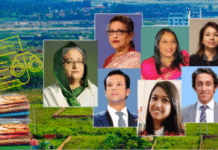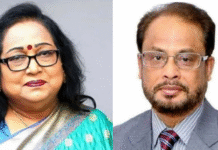

The United States stands alongside Bangladeshis of all faiths who came together to reject attacks against the minorities, said US Ambassador-at-Large for International Religious Freedom Rashad Hussain.
Hussain concluded his visit to Bangladesh on April 17-20 by emphasizing the importance of the respect for freedom of religion or belief for all people, everywhere.
He visited a Hindu community whose temple was destroyed in the violence last October, according to a media statement by the US Embassy in Dhaka today.
“The United States stands alongside Bangladeshis of all faiths who came together to reject such attacks, and we were encouraged to meet with so many people working to uphold interfaith harmony here in Bangladesh,” Rashad Hussain said.
He praised the government’s quick condemnation last October of religiously motivated violence against Hindu communities.
The ambassador also spoke about the importance of supporting and protecting those working to advance human rights, fostering interfaith dialogue and tolerance, and combating the efforts of those who seek to stoke division and incite violence.
During his time here, he met with Rohingyas in Cox’s Bazar to discuss their experiences and learn more about the important role religion plays in providing hope and promoting resilience.
In Dhaka, Ambassador Hussain met with Bangladeshi senior government officials, including the State Minister for Foreign Affairs and the State Minister for Religious Affairs.
In his meetings, Rashad Hussain reiterated US support for religious freedom and freedom of expression, and he expressed gratitude to Bangladesh for its generosity in hosting Rohingya refugees.
The ambassador also encouraged Bangladeshi government officials to help Rohingya build better futures for themselves, including by providing broader access to education and additional resources to help them improve their livelihoods, and by protecting and promoting their human rights.
Ambassador Hussain also met with Bangladeshi civil society and youth and encouraged religious co-existence among members of different faith groups, as well as the protection of the rights of those who choose not to believe.









